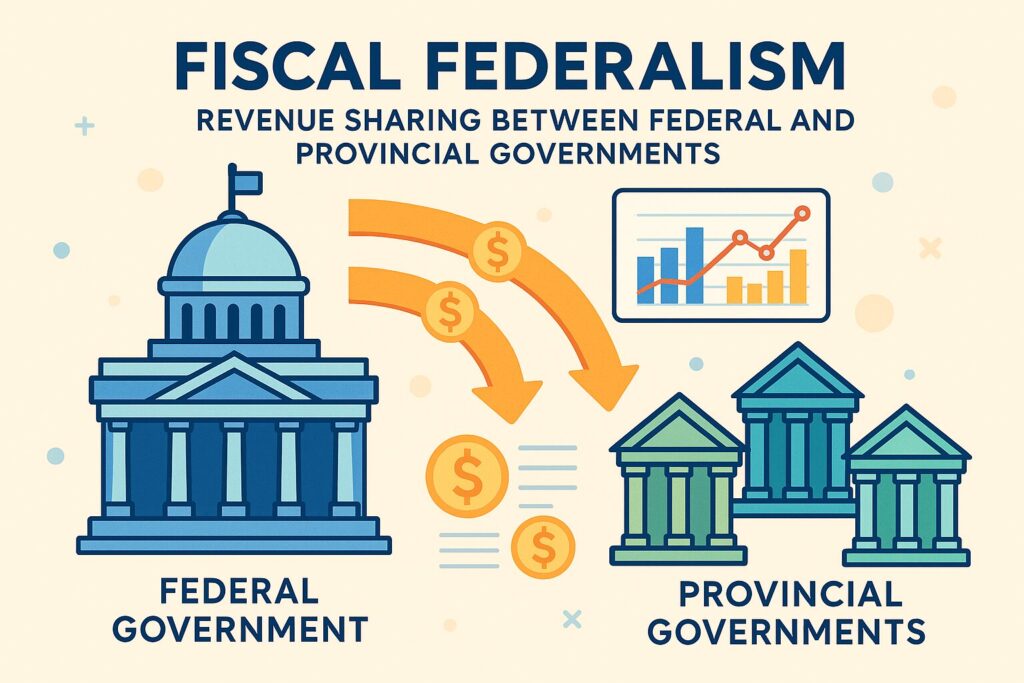
Fiscal federalism in Pakistan has evolved significantly since the 18th Constitutional Amendment in 2010, which redefined revenue-sharing mechanisms and devolved key responsibilities like health, education, and agriculture to provinces. Today, provinces rely on a mix of federal transfers and own-source revenues to fund their mandates, but imbalances persist in financial autonomy and resource distribution. With federal transfers constituting over 80% of provincial revenues in some regions, questions arise about equitable allocation, fiscal discipline, and the capacity to address localized challenges. This article explores how revenue is shared between tiers of government, the role of institutions like the National Finance Commission (NFC), and the challenges of sustaining cooperative federalism in a diverse economy.
The NFC Award: Framework for Vertical and Horizontal Distribution
The NFC Award, constitutionally mandated every five years, determines the division of federally collected taxes (income, sales, customs) between the federal government and provinces (vertical distribution), followed by inter-provincial allocation (horizontal distribution). The 7th NFC Award (2015–20) remains operational amid delays in finalizing the 8th and 9th iterations, allocating 57.5% of the divisible pool to provinces—up from 47.5% pre-18th Amendment. Horizontal distribution uses a formula weighted toward population (82%), but also factors in poverty (10.3%), revenue generation (5%), and inverse population density (2.7%).
7th NFC Vertical Distribution (2022–23)
| Recipient | Share of Divisible Pool |
|---|---|
| Federal Government | 42.5% |
| Provinces | 57.5% |
Horizontal Allocation (Provinces):
- Punjab: 52–54%
- Sindh: 24–25%
- Khyber Pakhtunkhwa (KP): 14–15%
- Balochistan: 9–10%
Provincial Revenue Generation: Limited Autonomy
Despite expanded responsibilities, provinces generate only 15–20% of their revenues independently, primarily through:
- Sales Tax on Services: Sindh leads, collecting Rs. 250 billion annually.
- Property Taxes: Punjab generates Rs. 30–40 billion yearly.
- Agricultural Income Tax: Underutilized due to political resistance; contributes <1% to provincial revenues.
Balochistan and KP remain heavily dependent on federal transfers (85–90% of revenues), limiting their ability to tailor spending to local needs. Punjab and Sindh fare better but still face structural gaps—for instance, Punjab spends 70% of its budget on salaries and pensions, leaving scant resources for development.
Challenges in Cooperative Federalism
- Delays in NFC Awards: Political deadlocks stall consensus; the 8th NFC remains pending since 2020, creating fiscal uncertainty.
- Unfunded Mandates: Provinces bear the cost of devolved functions without commensurate revenue tools. Health and education spending remains below global benchmarks (2–3% of GDP combined).
- Dispute Over Hydel Profits: KP’s longstanding claim to royalties from federal hydropower projects (estimated Rs. 1.2 trillion arrears) remains unresolved, straining federal-provincial relations.
- Horizontal Inequities: Population-centric allocations penalize smaller provinces. Balochistan, with 44% of Pakistan’s land and 5% of its people, receives minimal funds for infrastructure in vast territories.
Toward Equitable and Sustainable Reforms
Addressing these challenges requires institutional and policy reforms:
- Expanding Provincial Tax Bases: Digitizing land records, automating sales tax collection, and rationalizing agricultural taxation.
- Revising NFC Criteria: Increasing weights for poverty, area, and security expenditures to reflect ground realities.
- Strengthening Provincial Fiscal Commissions: Enhancing coordination on shared responsibilities like climate resilience.
The COVID-19 pandemic and 2022 floods exposed the fragility of current arrangements, as provinces lacked reserves to respond effectively. For instance, Sindh demanded advance NFC transfers to fund rehabilitation, highlighting systemic liquidity risks.
Fiscal federalism in Pakistan remains a work in progress. While the 18th Amendment decentralized authority, financial dependency on federal transfers undermines provincial autonomy. Balancing equity with efficiency, modernizing revenue systems, and depoliticizing NFC negotiations are critical to achieving the promise of cooperative federalism. Without these steps, disparities in service delivery and development outcomes will persist, exacerbating regional tensions.
This article was published on PublicFinance.pk.
